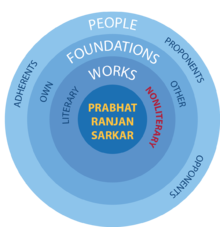Artha
| Artha | |
|---|---|
| Short description | Anything that gives temporary relief from suffering |
| Location in Sarkarverse | |
Artha (Bengali: অর্থ, Devanagari: अर्थ) is anything that gives temporary relief from suffering. In general, the word "Artha" means "wealth" or "money".[1] It also means "meaning" or "significance".[2][3]
According to Shrii Shrii Anandamurti money or other worldly thing are considered "artha" only if these things can destroy a person's suffering. The moment a thing fails to cure a person's suffering, it is not an "artha" any more. He also tells that, the permanent cessation of human being's all affliction and suffering is named Paramartha..
Meaning
In Sanskrit, Artha has got two meanings, two significances. One is purely psychic. Another is psychic but associated with physical. When it is purely psychic, the word Artha means “meaning”. “What is its Artha?” means “What is its meaning?” Another meaning of Artha is the object, the token, the entity with which you can quench your thirst, that is… Money!
Anything that gives temporary liberation from suffering or bondages is called Artha. Bondages such as the necessity for food, water, clothes, accommodation, medical treatment, etc. are related to this world and are physical in nature. Anything that gives temporary relief from these bondages are called Artha. As mostly money or wealth is required to collect things like food, clothes, accommodation etc, in general "artha" means money or wealth. According to Anandamurti, human beings must continue their efforts to attain artha if they have not yet attained Paramartha.[3]
The word artha also means "meaning", because knowing the meaning of something helps to eliminate the root of suffering.[5] In the Sanskrit sentence "Itihásati iti arthá itihása", "arha" means meaning.[5]
Another meaning of artha is "intellectual pursuit". According to Anandamurti, human beings generally suffer from three afflictions or bondages— physical, mental and spiritual. That which alleviates these three afflictions is called artha. Anandamurti discusses this three spheres of afflictions—[5]
We know that in the physical sphere human beings suffer in various ways – not only from the shortage of food and clothing, but also from others pains and sorrows as well. Suppose someone falls down while walking; this is also suffering in the physical sphere.
In the psychic sphere, too, people suffer much pain, for example at the death of a beloved one. Even those people who have no problems of food, clothing, accommodation or education or medical care, also bitterly weep at the loss of their near and dear ones. This is psychic affliction.
Then there is spiritual affliction. “Parama Purusa is mine, and I am His – this I realize. Yet I cannot make Him exclusively my own at all times.” This affliction of not attaining Parama Purusa as close as one desires, is spiritual affliction.
Second varga
Artha is the second of the four vargas.[6] Initially, artha (here "artha" means "wealth" or "prosperity") is the second most important reason of a person's devotion and a basic goal of life. Anandamurti says, many people worship various deities in pursuit of artha (mundane wealth).[7] The acoustic root of artha is "Sha" (Bengali: শ, Devanagari: श).[8]
Paramartha
- Main article: Paramartha
Anandamurti tells, money or other worldly things can not give permanent relief to a person. These things are considered as artha only if these can destroy a person's worldly suffering, however, these cannot bring permanent relief to pain and miseries. Hunger removed today will return tomorrow; a disease cured today may strike again tomorrow.[9] Nothing in this world can quench human mind's infinite thirst. That's why, the permanent cessation of these triple affliction is named Paramartha.[10]
Derived words
The following words are derived from the word "artha"—
- Arthakaoliinya: financial superiority[11]
- Artharthi: one who is desiring artha
- Atha: the word "Atha" means "Artha".The word comes from Mágadhi Prákrta. It is not used in modern Bengali or in any other Mágadhi Prákrta originated language.[12]
References
- ^ Prabhat Ranjan Sarkar Samskrta glossary Ananda Marga Pracarka Samgha
- ^ Shrii Shrii Anandamurti "This World and the Next" Subháśita Saḿgraha Part 4
- ^ a b Shrii Shrii Anandamurti "Yatamána – 2" Ananda Marga Philosophy in a Nutshell Part 5
- ^ Shrii Shrii Anandamurti "Pinnacled Existence" Ánanda Vacanámrtam Part 14
- ^ a b c Prabhat Ranjan Sarkar "Verse, Mythology, History and Itihása" A Few Problems Solved Part 3
- ^ Shrii Shrii Anandamurti "The Four Vargas and Devotion" Ánanda Vacanámrtam Part 6
- ^ Shrii Shrii Anandamurti "The Expansion of the Microcosm" Subháśita Saḿgraha Part 5
- ^ Shrii Shrii Anandamurti "The Acoustic Roots of the Indo-Aryan Alphabet" Ananda Marga Philosophy in a Nutshell Part 8
- ^ Shrii Shrii Anandamurti "The Only Way to Salvation" Ananda Marga Ideology and Way of Life in a Nutshell Part 6
- ^ Shrii Shrii Anandamurti "Vashiikára – 2" Ananda Marga Philosophy in a Nutshell Part 6
- ^ Prabhat Ranjan Sarkar "Kulaka to Kulottha (Discourse 33)" Shabda Cayaniká Part 5
- ^ Prabhat Ranjan Sarkar "Acala to Atha" Shabda Cayaniká Part 1
